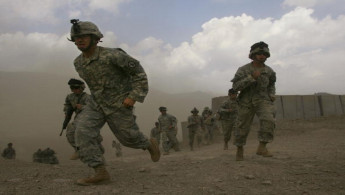New bill to improve visa programme for Afghan interpreters who helped American soldiers
A bipartisan group of US Senators has presented legislation aimed at improving a visa programme for Afghan nationals who helped the United States prior to its withdrawal from the war-torn country.
The draft bill, introduced on Thursday, would expand the number of authorised visas by 20,000 and revise some of the eligibility requirements Afghan interpreters and other collaborators.
Proponents aimed to increase "the number of authorised visas and remov[e] cumbersome requirements that leave folks in limbo", New Hampshire Democrat Jeanne Shaheen said.
We can't abandon Afghans who risked their lives to support the US-led mission in Afghanistan. They need our help as they face Taliban persecution.
— Sen. Jeanne Shaheen (@SenatorShaheen) June 11, 2021
I'm leading a bipartisan push w/@SenJoniErnst to improve the SIV program & ensure our Afghan allies' safety.https://t.co/AdFIa93ITz
The new legislation would lower the eligibility requirement for applicants, from two years to one year of service, and postpone the medical evaluation requirement until the applicant and their family members are in the United States.
It would also remove the need for applicants to obtain a sworn statement testifying to the threat they face in their homeland, as well as the requirement that they performed "sensitive and trusted" activities.
The legislation would also extend special immigrant status to certain spouses and children of applicants who have been murdered.
The bill comes amid concern that the US withdrawal will leave some 18,000 Afghan interpreters, commandos and others who backed American forces vulnerable to retaliation by the Taliban group.
More than half of US troops and military equipment have been so far repatriated, according to the US Central Command.
"In acknowledgment of the threats they face in aiding the US, we must extend and expand the Afghan Special Immigrant Visa Program in order to ensure their safety and the safety of their families," said Dick Durbin, an Illinois Democrat.
Lawmakers are pushing for a vote as soon as possible.
Ned Price said last week that the department had increased staff in Washington to process the applications and has "approved a temporary increase in consular staffing in our embassy in Kabul to conduct interviews and to process visa applications."
General Mark Milley, the chairman of the US Joint Chiefs of Staff, told a congressional panel on Thursday that the US will do all that is necessary to ensure the wellbeing of those who have worked alongside Americans for the past two years.
"I can commit to you that it's my belief that the United States government will do what is necessary in order to ensure the safety and protection of those that have been working with us for two decades," Milley said.
The Taliban said the same day that Afghans who worked with foreign forces in the past have nothing to fear once international troops leave, as long as they "show remorse."
In recent weeks, many interpreters have demonstrated in Kabul, demanding that foreign forces and embassies which they worked with help them relocate.





 Follow the Middle East's top stories in English at The New Arab on Google News
Follow the Middle East's top stories in English at The New Arab on Google News


